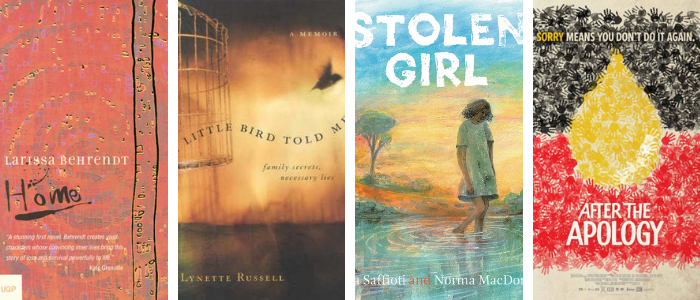AustLit
-
We acknowledge the traditional land on which we stand and pay our respects to Aboriginal and Torres Strait Islanders, their elders, past, present, and future.
Warning: Please be aware that some of these works and agent records may contain images, artwork, perspectives and stories from people who are now deceased. They may also contain words, terms or descriptions which may be culturally sensitive and are considered inappropriate today, but which reflect the period in which they were written.
-
From the early 1900s to the 1970s, ‘white Australia’ assimilation policies were founded on an assumption that Indigenous people were inferior, and that they should be allowed to 'die out' through 'natural' elimination processes or at a minimum be assimilated into the white community by abandoning their heritage (Australians Together, 2014). It was believed that Indigenous children were disadvantaged by staying in their own communities and that they would receive a better education and a more 'civilised' upbringing if they were adopted into white families or placed into government care institutions (National Sorry Day Committee, 1998). During this period, Australian Federal, State and Territory government agencies, church missions and welfare bodies forcibly removed Indigenous children from their families and their traditional countries. Today, these children are known as ‘The Stolen Generations’ (National Sorry Day Committee, 1998; Healey, 2009).
Those children taken from their families and homelands were either placed in institutions or adopted. They were given a lower standard of education compared to that available to non-Indigenous children, taught to reject their Indigenous heritage, forbidden to speak their traditional languages; and had their names changed. Some who were fortunate enough to have been placed with caring foster parents have flourished. But, those children who were placed in unsatisfactory conditions, either with foster parents or in institutions, have struggled in their adult lives to overcome their experiences of trauma, loss, isolation and abuse (National Sorry Day Committee website, 1998).
Many people from the Stolen Generations have written accounts in a variety of literary forms of their experiences of survival and the impact such policies had and still have on Aboriginal people. Writing has been a means of healing the scars of removal (Heiss 2015). This BlackWords trail presents autobiographies, biographies, novels, children's stories, anthologies, poems and songs, oral histories, plays, and films written by many Stolen Generations survivors and/or by their family members. They depict the emotional, psychological and physical traumas of their experiences, and the disruption of their oral and cultural knowledge.
Key reading. Our Truths: Aboriginal Writers and the Stolen Generations by Anita Heiss.
-
Bringing Them Home: Separation of Aboriginal and Torres Strait Islander Children from their Families
Published on 11 Jun 2014
This documentary DVD was produced in 1997 and forms part of the Bringing them home education resource for use in Australian classrooms.
Access more on the report here..
This resource is based on 'Bringing them home' , the report of the National Inquiry into the Separation of Aboriginal and Torres Strait Islander Children from Their Families, and on the history of forcible separation and other policies which have impacted on the lives of Indigenous Australians. This documentary complements a collection of curriculum-linked activities and teaching resources, plus a range of photographs, maps and diagrams, timelines, legal texts and glossaries.
The Australian Human Rights Commission invites teachers and students to use this resource to explore, understand and reflect on one of the most difficult chapters of our national history and to engage with some of the key concepts involved in the reconciliation debate in Australia. See the education resource here.https://www.humanrights.gov.au/educat...
Warning: This video may contain images / voices of deceased Aboriginal and Torres Strait Islander persons.
Video produced by Oziris. © Australian Human Rights Commission
-
BlackWords records information on Stolen Generations in biography and autobiography; children’s literature; poetry and song; fiction (including novels); drama and film; anthology; and more.
Guided searches on Stolen Generations:
children's + young adult texts poetry oral history novels film and tv keyword search across all AustLit
You might be interested in...





